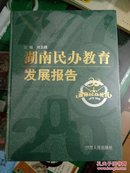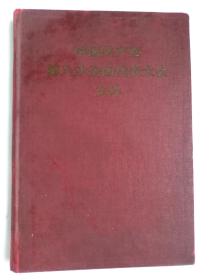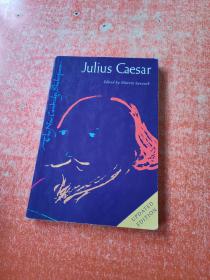
Julius Caesar
凯撒大帝 莎士比亚著
¥ 10 2.3折 ¥ 43 九五品
仅1件
湖南常德
认证卖家担保交易快速发货售后保障
作者William Shakespeare
出版社Random House US
出版时间1988-01
版次1
装帧平装
货号70-8外
上书时间2024-08-03
- 在售商品 暂无
- 平均发货时间 11小时
- 好评率 暂无
- 店主推荐
- 最新上架
商品详情
- 品相描述:九五品
图书标准信息
- 作者 William Shakespeare
- 出版社 Random House US
- 出版时间 1988-01
- 版次 1
- ISBN 9780553212969
- 定价 43.00元
- 装帧 平装
- 开本 48开
- 纸张 胶版纸
- 页数 241页
- 【内容简介】
-
Book Description
In this striking tragedy of political conflict, Shakespeare turnsto the ancient Roman world and to the famous assassination ofJulius Caesar by his republican opponents. The play is one oftumultuous rivalry, of prophetic warnings–“Beware the ides ofMarch”–and of moving public oratory, “Friends, Romans, countrymen!”Ironies abound and most of all for Brutus, whose fate it is tolearn that his idealistic motives for joining the conspiracyagainst a would-be dictator are not enough to sustain the movementonce Caesar is dead.
Each Edition Includes:
* Comprehensive explanatory notes
* Vivid introductions and the most up-to-date scholarship
* Clear, modernized spelling and punctuation, enabling contemporaryreaders to understand the Elizabethan English
* Completely updated, detailed bibliographies and performancehistories
* An interpretive essay on film adaptations of the play, along withan extensive filmography
Synopsis:
In this striking tragedy of political conflict, Shakespeare turnsto the ancient Roman world and to the famous assassination ofJulius Caesar by his republican opponents. The play is one oftumultuous rivalry, of prophetic warnings--"Beware the ides ofMarch"--and of moving public oratory "Friends, Romans, countrymen!"Ironies abound and most of all for Brutus, whose fate it is tolearn that his idealistic motives for joining the conspiracyagainst a would-be dictator are not enough to sustain the movementonce Caesar is dead.
Amazon.co.uk Review
One of Shakespeare's most political plays, Julius Caesar continuedShakespeare's interest in Roman history, first developed in TitusAndronicus. Drawing on Plutarch, the great historian of Rome,Shakespeare dramatises one of the most crucial moments in Romanhistory--the assassination of Julius Caesar. Loved by the Romancrowd but increasingly feared by the Senators, Caesar increasinglyshows signs of his desire to abolish the Republic and crown himselfemperor. A conspiracy is hatched, led by Cassius and Brutus, whomurder Caesar on the steps of the Capitol. Mourning over his deadfriend's body, Mark Antony gives one of the famous rhetoricalspeeches in literature, asking "Friends, Romans, Countrymen" tolament Caesar's death, privately vowing to "let slip the dogs ofwar" against those who have shed Caesar's blood. Antony joinsforces with Caesar's son Octavius to defeat Cassius and Brutus inbattle, and establish an uneasy alliance whose collapse isdramatised in Shakespeare's later play Antony and Cleopatra.Written at the end of Queen Elizabeth's reign, Julius Caesar hasbeen seen by many as a radically pro-Republican play which sailedclose to the political wind of the time.
--Jerry Brotton
From the Author
It's two, two, two plays in one!
Shakespeare's play "Julius Caesar" is the only tragedy he wrotewhere the title character dies in the third act. The real "tragichero" is Brutus, who is the last to die in the play.It's alsointeresting to note Marc Antony, a minor character in the first twoacts, who comes to the forefront in his funeral oration. But hisnobility declines in Act 4, where Shakespeare shows him to beinfluenced by power.There is no direct confrontation between theprotagonists and the antagonists in the play. Both Cassius andBrutus come to their ends by their own hands.
Book Dimension:
length: (cm)17.9 width:(cm)10.8 - 【作者简介】
- William Shakespeare was born in Stratford-upon-Avon in April1564, and his birth is traditionally celebrated on April 23. Thefacts of his life, known from surviving documents, are sparse. Hewas one of eight children born to John Shakespeare, a merchant ofsome standing in his community. William probably went to the King’sNew School in Stratford, but he had no university education. InNovember 1582, at the age of eighteen, he married Anne Hathaway,eight years his senior, who was pregnant with their first child,Susanna. She was born on May 26, 1583. Twins, a boy, Hamnet ( whowould die at age eleven), and a girl, Judith, were born in 1585. By1592 Shakespeare had gone to London working as an actor and alreadyknown as a playwright. A rival dramatist, Robert Greene, referredto him as “an upstart crow, beautified with our feathers.”Shakespeare became a principal shareholder and playwright of thesuccessful acting troupe, the Lord Chamberlain’s Men (later underJames I, called the King’s Men). In 1599 the Lord Chamberlain’s Menbuilt and occupied the Globe Theater in Southwark near the ThamesRiver. Here many of Shakespeare’s plays were performed by the mostfamous actors of his time, including Richard Burbage, Will Kempe,and Robert Armin. In addition to his 37 plays, Shakespeare had ahand in others, including Sir Thomas More and The TwoNoble Kinsmen, and he wrote poems, including Venus andAdonis and The Rape of Lucrece. His 154 sonnets werepublished, probably without his authorization, in 1609. In 1611 or1612 he gave up his lodgings in London and devoted more and moretime to retirement in Stratford, though he continued writing suchplays as The Tempest and Henry VII until about 1613.He died on April 23 1616, and was buried in Holy Trinity Church,Stratford. No collected edition of his plays was published duringhis life-time, but in 1623 two members of his acting company, JohnHeminges and Henry Condell, put together the great collection nowcalled the First Folio.
- 【目录】
-
Introduction
Julius Caesar on Stage
Julius Caesar on Screen
The Playhouse
JULIUS CAESAR
Date and Text
Textual Notes
Shakespeare's Sources
Further Reading
Memorable Lines
点击展开
点击收起
相关推荐
— 没有更多了 —































以下为对购买帮助不大的评价